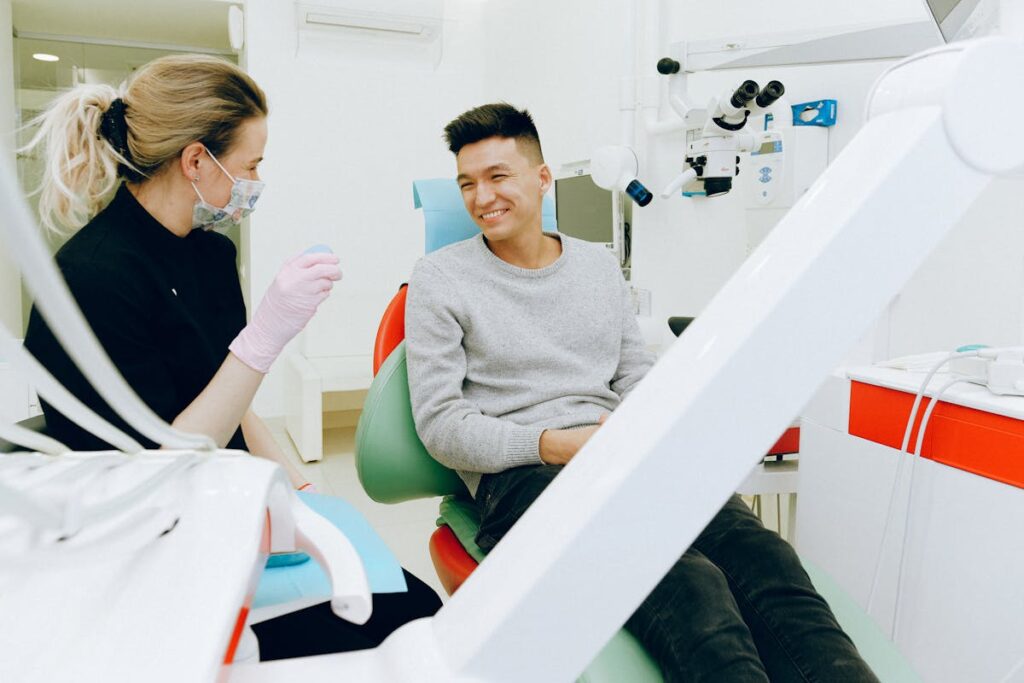How we manage and prioritize our family’s dental health can greatly impact their overall wellbeing. Having a dedicated family dentist who understands the unique needs and history of each family member can be a strategic decision. Not only does it offer the convenience of combined appointments, but it also guarantees a continuity of care that spans from childhood to senior years. A family dentist can help instill excellent oral hygiene habits for life. But what should you look for in a family dentist, and how can they help overcome dental anxieties? Let’s explore.
Understanding the Role of a Family Dentist
In the domain of dental care, a family dentist plays a pivotal role. This professional provides extensive care, addressing the unique dental needs of every family member – from toddlers to grandparents. Family dental services encompass a broad spectrum of preventative, curative, and cosmetic procedures, all aimed at maintaining and enhancing oral health.
The family dentist is, fundamentally, a generalist who possesses extensive knowledge and skills in various areas of dentistry. They can perform routine check-ups, fill cavities, extract teeth, and provide orthodontic solutions, among other services. Unlike specialists who focus on specific aspects of dental health, the family dentist is equipped to deal with a wide range of dental issues, regardless of the patient’s age.
Moreover, by establishing a long-term relationship with the whole family, the dentist gains a thorough understanding of genetic predispositions, lifestyle influences, and changing dental needs over time. This familiarity is instrumental in the development and implementation of tailored, extensive care plans.
Benefits of a Family Dentist
Choosing a family dentist offers a myriad of benefits that extend beyond basic dental care. Foremost among these benefits is the role a family dentist plays in preventive care. By regularly visiting a family dentist, potential dental issues can be identified early, and preventive measures can be taken to avoid serious complications. This proactive approach to dental health can save patients from discomfort and expensive treatments in the future.
Furthermore, family dentists offer extensive services that cater to all aspects of oral health. From routine cleanings and checkups to more complex procedures like root canals or dental implants, family dentists are equipped to handle a wide range of dental needs. This makes scheduling appointments easier and more convenient, as families can consolidate their dental care under one roof.
Moreover, having a dedicated family dentist fosters a strong patient-dentist relationship. Over time, the dentist becomes familiar with each family member’s dental history and unique needs. This familiarity allows for personalized care and more accurate diagnoses. So, the benefits of a family dentist go beyond mere convenience, they also mean better, more tailored dental care for you and your family.
Age-Specific Dental Care
Steering through the various stages of dental health across different ages requires an all-encompassing understanding of age-specific dental care. Dental needs transform as we grow, changing from toddlers’ teething to teenagers’ orthodontics. Consequently, knowledge of age-specific dental care is vital for maintaining ideal oral health throughout life.
To provide a clearer picture, here is a rundown of the varying needs at different stages of life:
- Infancy and Toddlers: During this stage, the focus is on managing teething discomfort and establishing a regular dental hygiene routine. Regular check-ups can help identify and rectify dental issues early.
- Childhood: This stage requires reinforcement of good oral hygiene habits, cavity prevention, and monitoring of jaw growth.
- Teenagers: This is when orthodontic work, such as braces or aligners, may be necessary. Regular cleanings and cavity checks remain important.
- Adulthood: Preventive care becomes essential to avoid gum diseases, tooth loss, and other complications.
- Seniors: Emphasis is on the maintenance of oral health, managing gum diseases, and care for dentures or implants if required.
Thus, age-specific dental care underpins a lifetime of healthy teeth and gums. This journey begins with toddlers’ teething and can extend to teenagers’ orthodontics and beyond.
Convenience and Flexibility
While managing dental health remains a priority, convenience and flexibility in dental care are also essential for many people. In today’s fast-paced world, scheduling appointments must be streamlined to accommodate busy lifestyles. A family dentist often offers flexible appointment times, including early mornings, late afternoons, and sometimes even weekends. This eases the stress of juggling appointments with work, school, and other commitments, ensuring that dental care does not take a backseat.
Location accessibility also plays an important role in choosing a family dentist. Dental practices located near home, work, or school make it easier for the entire family to receive regular check-ups and treatments. This not only saves travel time but also reduces the hassle of maneuvering through traffic or public transportation.
Moreover, a family dentist understands that unexpected dental emergencies can occur. As a result, they typically offer emergency services and can accommodate last-minute schedule changes. This flexibility is invaluable in managing unforeseen dental issues efficiently.

Building Lifelong Dental Habits
The establishment of lifelong dental habits begins with encouraging regular brushing routines and understanding the importance of routine check-ups. Regular brushing and flossing guarantee the maintenance of oral hygiene and health, acting as the first line of defense against dental diseases. Additionally, routine dental check-ups provide an opportunity for early detection and treatment of potential oral health issues, reinforcing the significance of these practices in building sustainable dental habits.
Encouraging Regular Brushing Routines
In the domain of oral health, establishing regular brushing routines is a vital step towards building lifelong dental habits. It is essential to make the process enjoyable for children to encourage their active participation. Consequently, incorporating fun rewards and brushing techniques can play a significant role in establishing these routines.
Consider these strategies to encourage regular brushing routines:
- Gamification of Brushing Routines: Turn brushing time into a fun game. This could involve racing to see who finishes brushing first or using an app that makes brushing an interactive experience.
- Brushing Techniques Demonstrations: Show your child the proper brushing techniques, emphasizing the importance of cleaning all areas of the mouth.
- Reward System: Implement a system where children earn fun rewards for consistently brushing their teeth. This might be a sticker chart or a small prize after a week of successful brushing.
- Routine Consistency: Maintain a consistent brushing schedule. This helps to instill the routine in the child’s daily activities.
- Positive Reinforcement: Praise your child when they brush their teeth without being reminded. This reinforces the positive behavior and motivates them to continue.
Importance of Routine Check-ups
Regular dental check-ups form the cornerstone of ideal oral health, serving as preventative maintenance for our teeth and gums. They are an integral part of preventive care, aiding in the early detection of oral health issues such as cavities, gum disease, and oral cancer. Timely intervention can prevent these issues from escalating into serious conditions that may require complex and costly treatments.
Routine check-ups also facilitate professional cleaning, which is essential for maintaining excellent oral hygiene. Despite our best efforts at home, plaque and tartar can accumulate in hard-to-reach areas, causing gum inflammation and tooth decay over time. Professional cleaning can effectively remove this buildup, promoting healthier teeth and gums.
Moreover, regular dental visits provide an opportunity for patient education. Dentists can offer personalized advice on improving oral hygiene practices, dietary habits, and lifestyle choices that directly impact oral health. They can also guide parents on children’s oral health, helping them establish good dental habits from an early age.
Choosing the Right Family Dentist
Steering through the myriad of options for family dentists may seem like an intimidating task. However, an informed decision can guarantee a positive experience and foster good dental health for your family.
Here are some considerations to guide you:
- Insurance Coverage: Ascertain that the dental practice you choose accepts your insurance coverage. This is crucial for making dental care affordable.
- Dentist Credentials: Verify that the dentist has the necessary qualifications and experience. Look for board certifications, affiliations, and any potential malpractice claims or disciplinary actions.
- Services Offered: Confirm that the dental office provides a range of services, from preventative care to cosmetic procedures, that cater to all family members.
- Location and Office Hours: Opt for a dentist that is conveniently located and has flexible hours, particularly if you have school-going children.
- Patient Reviews: Reading reviews from current and former patients can offer valuable insights into the dentist’s practice.
Overcoming Dental Anxiety With Familiarity
Dealing with dental anxiety is a common issue that affects a significant portion of the population. This fear can stem from various factors, including past traumatic experiences, fear of pain, or the impersonal nature of clinical settings. However, by fostering familiarity with the dental environment, we can substantially alleviate this condition.
One effective way to overcome dental anxiety is through repeated exposure to the dental setting, a process that enhances dental comfort. This could involve regular, non-threatening visits to the family dentist, which allows for the gradual building of trust and familiarity with the dentist, dental staff, and the environment. These visits can also be used as opportunities to learn more about dental procedures, which can demystify the process and reduce fear of the unknown.
Another essential component is anxiety management, which can take various forms. Some family dentists offer relaxation techniques, such as deep breathing or guided imagery. Others may offer sedation dentistry for particularly anxious patients. The key is to find a family dentist who understands and is willing to work with your family’s unique anxiety needs, ensuring a comfortable and stress-free dental experience.
Frequently Asked Questions
What Are the Costs Associated With Visiting a Family Dentist?
Costs associated with visiting a family dentist vary based on the type of procedures performed. However, insurance coverage often reduces out-of-pocket expenses, particularly for preventive care such as cleanings and routine check-ups.
How Frequently Should Each Family Member Visit the Dentist?
Each family member should ideally visit the dentist every six months. However, the frequency of children’s dental visits may be higher, depending on their oral health needs. Regular appointments guarantee peak dental health for all family members.
What Types of Dental Procedures Can a Family Dentist Perform?
A family dentist can perform a wide range of dental procedures, from preventive treatments like cleanings and fluoride applications, to cosmetic procedures such as teeth whitening, veneers, and orthodontic aligners for improved aesthetics and function.
Are There Special Dental Care Tips for Pregnant Women?
Yes, pregnant women require special dental care due to hormonal changes. These changes can affect oral health, increasing the risk of gum disease. Regular dental check-ups, good oral hygiene, and a balanced diet are essential during pregnancy.
What Should I Do in Case of a Dental Emergency?
In case of a dental emergency, it’s important to apply dental first aid immediately. Keep your dentist’s emergency contact details handy and reach out to them at the earliest for professional assistance and further guidance.
